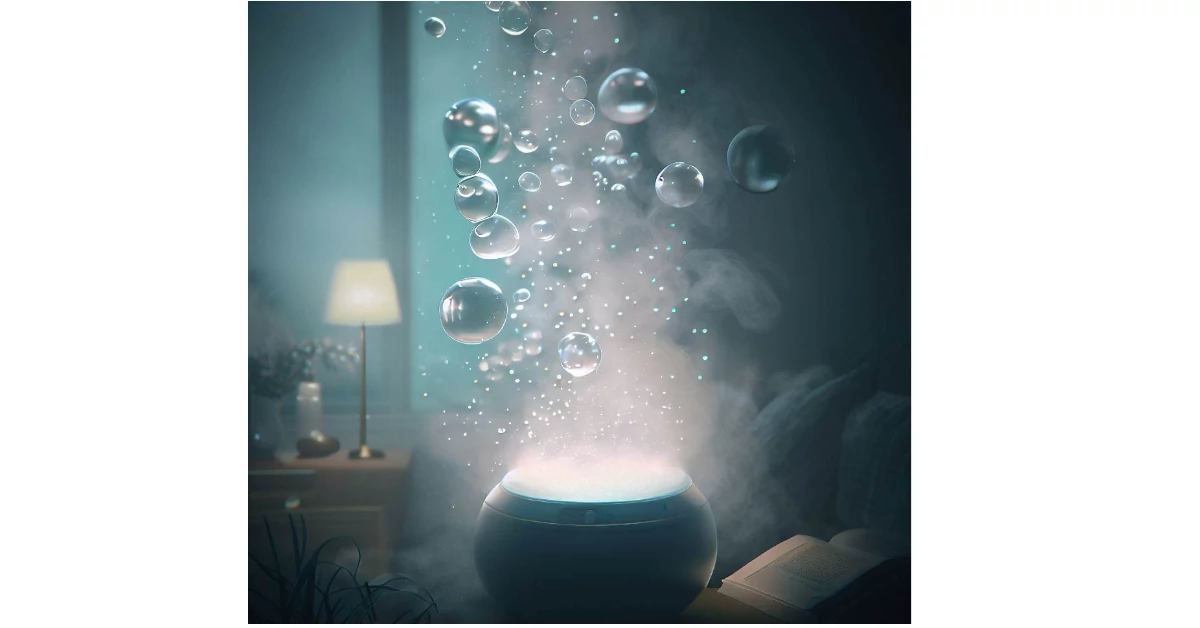Tired of always having to change the filters in your humidifier? Do you want to bring essential oils into your home in a more natural and effective way? Look no further than a diffuser that doesn’t have a screen.
Not only does it save you money in the long run, but it is also better for your health and the environment.
In this piece, I’ll talk about why a filterless essential oil diffuser is a must-have for any home and what its benefits are.
Prepare to feel better and say goodbye to filters for good.
Essential Oil Diffusers

An essential oil diffuser, which is also called a humidifier, is a device that spreads essential oils into the air to make the room smell nice or make you feel calm.
Essential oils are broken up into smaller molecules and spread out evenly in a way that makes it easy to breathe and doesn’t make the room smell bad.
Different essential oils are said to do different things.
For example, lavender is said to help you sleep.
The diffuser’s job is to fill the air in a room with tiny essential oil particles that can be breathed in.
This makes the room feel calmer and smell better.
Types of Essential Oil Diffusers
There are four main kinds of oil diffusers on the market: ultrasonic diffusers, nebulizing diffusers, heat diffusers, and liquid diffusers.
- Ultrasonic Diffusers: Ultrasonic diffusers are the most popular type and work by using water to disperse the essential oils into the air as a fine mist. These diffusers use ultrasonic vibrations to break up oil molecules and create a fine mist. Some of the best ultrasonic diffusers on the market include the Urpower 2nd Gen 300ml Aroma Essential Oil Diffuser, the Asakuki 500ml Essential Oil Diffuser, and the InnoGear Upgraded 150ml Aromatherapy Diffuser.
- Nebulizing Diffusers: Nebulizing diffusers are waterless and work by using pressurized air to break the essential oils into tiny particles that are then dispersed into the air. These diffusers do not require a water reservoir, and the essential oils being diffused do not go through a carrier water droplet. Instead, these diffusers work through a scientific principle called Bernoulli’s Principle, a fluid dynamics theory of physics.
- Heat Diffusers: Heat diffusers use heat to evaporate the essential oils into the air. These diffusers are not as popular as ultrasonic or nebulizing diffusers because the heat can alter the chemical composition of the essential oils, reducing their therapeutic benefits.
- Evaporative Diffusers: Evaporative diffusers use a fan to blow air through a filter or pad that has been soaked in essential oils. These diffusers work by placing reeds in a glass or plastic vessel containing essential oils or fragrance. The reeds soak up the oil and release fragrance through an evaporation diffusion process. Reed diffusers are the simplest type of diffuser and work by placing reeds in a bottle of essential oil. The reeds soak up the oil and release fragrance into the air.
Benefits of Essential Oil Diffusers
Aromatherapy and essential oil users like essential oil diffusers because they are a good way to get the health and fitness benefits of essential oils.
During this process, the body, mind, and mood all get a lot of good benefits.
Using essential oil diffusers has a number of perks, such as:
- Relaxation and stress relief
- Improved sleep quality
- Enhanced mood and concentration
- Relief from headaches and migraines
- Boosted immune system
- Respiratory support
Essential oil diffusers are machines that break up essential oils into smaller molecules and spread them through the air to make it smell good or calm you down.
There are four main kinds of oil diffusers on the market: nebulizing diffusers, ultrasound or humidifying diffusers, evaporative diffusers, and reed diffusers.
There are pros and cons to each type of diffuser, so it’s important to choose the right one for your needs.
Essential oil diffusers are a great way to enjoy the health and wellness benefits of essential oils and can help improve your general health.
Benefits of Using an Essential Oil Diffuser
Benefits of Essential Oil Diffusers
Essential oil diffusers can help both your physical and mental health in a number of ways.
They can be used to kill germs and mold, keep bugs away, and get rid of bad smells.
Diffusing essential oils can give you more energy, ease pain, and make it easier to breathe.
Essential oils can also help boost the immune system, improve memory and focus, and keep weight in check.
Emotional Benefits of Essential Oil Diffusers
A diffuser for essential oils can also help you feel better.
Diffusing essential oils can help calm feelings, improve mood, and give you a more optimistic view of life.
Essential oils can also help relax the mind and body, which can lower the risk of strokes, mood swings, and other illnesses.
Also, essential oils can help the body and mind adjust to different patterns and times of day.
Types of Essential Oil Diffusers
There are different kinds of diffusers, such as ultrasonic diffusers that use high-frequency ultrasound waves to spread essential oils in a fine mist.
Using an oil diffuser can make your home feel like a spa and improve your health and happiness in general.
Moisture in the Air
Essential oil diffusers can add a little bit of wetness to the air, but not much.
Ultrasonic diffusers and other types of diffusers put out enough mist to add water to the air, which helps with dry air.
Nebulizers and evaporative diffusers, on the other hand, don’t send out enough vaporized water.
Diffusers are made to spread essential oils through the air, and they can make a cool mist like a humidifier.
Humidifying the Air
Even though diffusers can technically humidify the air while spreading essential oils, the water tank is generally small and not useful as a main humidifier.
Find a diffuser with an essential oil tray if you want to add moisture to the air and spread essential oils at the same time.
Aromatherapy works with high-capacity ultrasonic humidifiers, so you can get all the benefits of essential oils and more moisture in the air with the same device.
Using Essential Oils in a Diffuser
Using Pure Essential Oils
In a diffuser, you should only use pure essential oils.
Other oils, like perfumed or cooking oils, can have the opposite effect of what you want from aromatherapy.
They can make other oils not spread as well or smell bad.
Avoid essential oils that say “fragrance oils” or “perfume oils” on the box, as these are not pure essential oils.
Best Essential Oils for Diffusers
There are many essential oils that can be used in a diffuser, and the best ones will depend on what they are used for.
Here are some of the best essential oils to use in diffusers:
- Lavender oil: great for minor scrapes, burns, and bruises, as well as offering pain relief and calming effects.
- Jasmine oil: promotes relaxation and reduces stress.
- Lemon oil: has a refreshing and uplifting scent.
- Bergamot oil: has a citrusy and floral scent that promotes relaxation and reduces stress.
- Sandalwood oil: has a woody and earthy scent that promotes relaxation and reduces stress.
- Sweet orange oil: has a sweet and citrusy scent that promotes relaxation and reduces stress.
- Eucalyptus oil: has a refreshing and invigorating scent that promotes respiratory health.
- Chamomile oil: has a calming and soothing scent that promotes relaxation and reduces stress.
- Lemongrass oil: has a fresh and citrusy scent that promotes relaxation and reduces stress.
- Tea tree oil: has a fresh and medicinal scent that promotes respiratory health.
- Peppermint oil: has a refreshing and invigorating scent that promotes focus and concentration.
- Geranium oil: has a floral and sweet scent that promotes relaxation and reduces stress.
- Clary sage oil: has a herbal and earthy scent that promotes relaxation and reduces stress.
Blending Essential Oils
Essential oils can be used on their own or mixed with other oils to make a scent and healing effect that fits your needs.
For example, a mixture of lavender and chamomile can help you relax and sleep, while a mixture of peppermint and lemon can help you concentrate and focus.
Choosing the Right Essential Oil
Research and thought are needed to choose the right essential oil for your needs.
First, it’s important to know what you’re getting and to look for 100% pure and organic essential oils.
Low-quality oils can do more harm than good, so it is important to use pure, organic essential oils, which have the healing qualities you expect.
Think about the specific needs you want to meet, such as relaxing, alertness, uplifting, respiratory, or digestive, and look for essential oils that meet more than one need.
If you don’t know which essential oils to choose, look for oils that can be used in many ways and are recommended by aromatherapists, like lavender oil, peppermint oil, or tea tree oil.
To get the most out of a brand of essential oil, look for suppliers that meet the standards of being pure, unmixed, and of the highest quality.
Ultrasonic: The Key Technology behind Essential Oil Diffusers
When it comes to essential oil diffusers, ultrasonic technology is the way to go.
Unlike traditional humidifiers that use heat to create steam, ultrasonic diffusers use high-frequency vibrations to break down water and essential oils into a fine mist that is dispersed into the air.
This results in a more efficient and gentle diffusion process that preserves the therapeutic properties of the oils.
Ultrasonic diffusers are also known for their quiet operation, making them perfect for use in bedrooms or offices.
Additionally, they often come with added features such as color-changing lights and automatic shut-off, making them a popular choice for those seeking a holistic approach to wellness.
Overall, ultrasonic technology is an essential component of any high-quality essential oil diffuser.
For more information:
Ultrasonic Humidifiers: Benefits, Maintenance, and Safety

Maintaining Your Essential Oil Diffuser
Using an Essential Oil Diffuser
An essential oil diffuser is a device that spreads essential oils into the air.
This makes a nice smell and has many health benefits.
Diffusing essential oils is not an exact science, but a good rule of thumb is to do it for 15 to 20 minutes, which is more than enough time to fill a standard-sized room with smell molecules.
Most diffusers come with a timer setting these days, so you can make them fit your needs.
But some diffusers are made to work all day long.
Intermittent Diffusion
The best way to diffuse is in short bursts of 30 to 60 minutes on and 30 to 60 minutes off.
You can spread essential oils every day, but it’s important to pay attention to how you react to it.
It is best to only put 100% pure essential oils in the diffuser so that it doesn’t get clogged and you don’t have to clean it after every use.
Other Ways to Use Essential Oils
There are other ways to use essential oils besides diffusing them.
For example, you can use an aromatherapy inhaler, put a few drops on the shower floor, or put a drop in the palm of your hand and inhale slowly.
Cleaning Your Essential Oil Diffuser
Essential oil diffusers need to be cleaned often so that gunk and grime don’t build up.
You can clean an essential oil diffuser in three ways: regularly, deeply, and by fixing typical problems.
After each use, you should wipe down the diffuser’s sides with a cloth dampened with a 1:1 mixture of water and white vinegar.
It is also important to empty the water tank so that water that has been sitting still doesn’t build up inside the machine.
Once a month, you should do a deep clean to get rid of dust and buildup that can make the diffuser work less well.
To clean the diffuser really well, fill it halfway with clean water and add 10 drops of white vinegar.
Run the diffuser for 10 to 15 minutes, and then pour out the water.
Fixing Common Issues
Try cleaning the ultrasonic plate with a cotton swab dipped in rubbing alcohol to fix common problems like a diffuser that won’t mist or one that mists very little.
If the diffuser still won’t mist, try adding more water or cleaning it more carefully.
Before you try to clean the diffuser, you should always stop it.
Cleaning your essential oil diffuser on a daily basis will keep it working well and stop mold from growing in it.
Safety Concerns with Essential Oil Diffusers
Potential Risks of Essential Oils
Essential oils can hurt pets and kids if they are not used right.
They are plant substances that are very concentrated and can cause skin discomfort, breathing problems, and problems with hormones.
Pets, especially dogs and cats, are more sensitive to essential oils than people are.
If they eat or breathe in essential oils, they can have stomach upset, breathing problems, effects on the nervous system, and liver damage.
Peppermint, wintergreen, pennyroyal, eucalyptus, cinnamon, pine, thyme, sweet birch, and tea tree oils are all poisonous to pets.
Using Essential Oils Safely
To keep pets and kids safe when using essential oils, you should keep the oils out of their reach and never put them on pets or kids directly.
If you use a diffuser, make sure the room has good air flow and that the diffuser is out of reach of pets and children.
It is also important to use goods made by experts that contain essential oils that are safe for pets.
When using essential oils on pets, it’s important to keep in mind that each animal is different and may respond to a certain essential oil in a different way.
Start with a small amount of oil that has been reduced and see how the pet reacts before adding more.
If your pet eats or breathes in essential oils, you should call a vet right away.
Intermittent Diffusion
Don’t keep diffusing essential oils all the time.
It is better to spread essential oils on and off throughout the day than to do it all the time.
In an ideal world, essential oils should be diffused for 30–60 minutes on and 30–60 minutes off.
It’s also important to spread essential oils in a room with good air circulation.
Topical Use
When putting essential oils on the skin, it’s important to read the label to see if there are any warnings about sun sensitivity.
Some essential oils can make your skin sensitive to the sun, so you should stay out of strong sunlight or UV rays for at least 12 hours after using them.
Essential oils should also be kept where children can’t get to them.
Choosing High-Quality Essential Oils
Before you use essential oils, you should make sure to get ones that are of good quality and have been tried and found to be safe.
Some essential oils shouldn’t be put on the skin, taken by mouth, or used by people with certain allergies.
It is important to read the safety information that comes with each essential oil and follow the directions for use so that the body doesn’t get too much of a certain oil.
There are many reasons to use essential oils, but it is important to do so carefully.
Essential oil diffusers are a popular way to get all of these benefits, but it is important to use them safely.
Essential oils can hurt pets and kids if they aren’t used right, so it’s important to keep them out of reach and use goods made by experts that contain essential oils that are safe for pets.
It’s also important to spread essential oils intermittently rather than all day long, and to do so in a room with good air flow.
By following these rules, you can use essential oils safely and get the most out of them.
Conclusion

In conclusion, essential oil diffusers are a great way to get the benefits of aromatherapy in the comfort of your own home.
The fact that these diffusers don’t have filters makes them easy to clean and saves money in the long run.
But it’s important to keep in mind that not all essential oils are the same, and some may cause problems for some people.
Before you use any essential oils, it’s best to do some study and talk to a health professional.
If you already have a fan and love it, you might want to upgrade to an essential oil diffuser to improve your experience.
And if you’re thinking about buying one, make sure you pick one that fits your wants and tastes.
At the end of the day, essential oil diffusers are just one tool in the vast world of natural health.
They can help create a calm environment and have a number of health benefits, but they can’t fix everything.
So, take the time to look into different choices and find the one that works best for you.
And always keep an open mind and a good dose of skepticism when it comes to natural remedies.
Looking for a new Humidifier?
Choosing a gadget can be very difficult if you know nothing about the technology.
Some will pay for features they do not need while others may not consider what they really want.
So I created this quick, newbie guide to help you focus on what is really important to you:
The Best Humidifier (For You!)
Links and references
- “Can I Put Essential Oils in My Humidifier?” article on the Family Handyman website
- “The 6 Best Waterless Essential Oil Diffusers For 2022” article on the Bustle website
- “Essential Oil Safety (and Are Essential Oil Diffusers Safe?)” article on the Dr. Axe website
My article on the topic:

